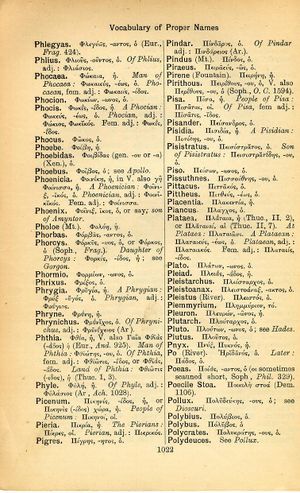Pluto: Difference between revisions
ὥστε ὁ βίος, ὢν καὶ νῦν χαλεπός, εἰς τὸν χρόνον ἐκεῖνον ἀβίωτος γίγνοιτ' ἂν τὸ παράπαν → and so life, which is hard enough now, would then become absolutely unendurable
m (Text replacement - "link={{" to "link={{") |
m (Text replacement - "}}]]" to "}}]]") |
||
| Line 1: | Line 1: | ||
{{WoodhouseENELnames | {{WoodhouseENELnames | ||
|Text=[[File:woodhouse_1022.jpg|thumb | |Text=[[File:woodhouse_1022.jpg|thumb | ||
|link={{filepath:woodhouse_1022.jpg | |link={{filepath:woodhouse_1022.jpg}}]][[Πλούτων]], -ωνος, ὁ; see [[Hades]]. | ||
}} | }} | ||
{{Lewis | {{Lewis | ||
Revision as of 10:11, 15 August 2017
English > Greek (Woodhouse)
Latin > English (Lewis & Short)
Plūto: or Plūton, ōnis, m., = Πλούτων,
I the king of the Lower World, the husband of Proserpine, and brother of Jupiter and Neptune, Cic. N. D. 2, 26, 66; Hyg. praef.; Verg. A. 7, 327; Juv. 13, 50.—Acc. Gr. Plutona, Hor. C. 2, 14, 7.—Hence,
II Plūtōnĭus, a, um, adj., of or belonging to Pluto, Plutonian: et domus exilis Plutonia, i. e. the realms. of death, the Lower Regions, Hor. C. 1, 4, 17.—Subst.: Plūtō-nĭa, ōrum, n. plur., a pestilential district in Asia, Cic. Div. 1, 36, 79.
Latin > French (Gaffiot 2016)
Plūtō (-tōn), ōnis, m. (Πλούτων), Pluton [fils de Saturne et d’Ops, frère de Jupiter et de Neptune, dieu des enfers] : Cic. Nat. 2, 66 ; Virg. En. 7, 327 || -tōnĭus, a, um, de Pluton : Hor. O. 1, 4, 17 || -tōnĭa, ōrum, n., région empestée de l’Asie : Cic. Div. 1, 79.
Latin > German (Georges)
Plūto u. Plūtōn, ōnis, m. (Πλούτων), der König der Unterwelt, Gemahl der Proserpina, Bruder Jupiters u. Neptuns, Form Pluto, Hyg. fab. praef. p. 8. M. Mythogr. Lat. 1, 108; 2, 10; 3, 6, 1: Form Pluton, Enn. bei Lact. 1, 14, 5 ed. Buenem. (Vahlen Enn. fr. var. 77 Pluto). Verg. Aen. 7, 327. Iuven. 13, 50. Claud. rapt. Pros. 1, 276; vgl. Plin. bei Charis. 118, 24: griech. Akk. Plutona, Hor. carm. 2, 14, 7. – Dav. Plūtōnius, a, um, zu Pluto gehörig, plutonisch, domus, das Grab, Hor.: coniunx, Proserpina, Prud. – Plur. subst., Plūtōnia, iōrum, n. (sc. loca), eine Gegend in Asien, viell. in Lydien, wo nach Strabo ein Tempel des Pluto war, Cic. de div. 1, 79.

